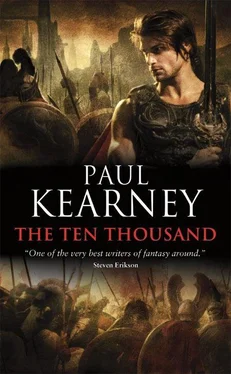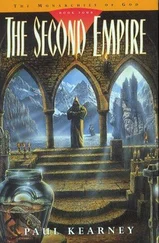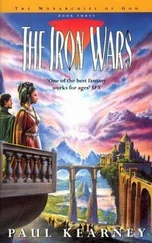Paul Kearney - The ten thousand
Здесь есть возможность читать онлайн «Paul Kearney - The ten thousand» весь текст электронной книги совершенно бесплатно (целиком полную версию без сокращений). В некоторых случаях можно слушать аудио, скачать через торрент в формате fb2 и присутствует краткое содержание. Жанр: Фэнтези, на английском языке. Описание произведения, (предисловие) а так же отзывы посетителей доступны на портале библиотеки ЛибКат.
- Название:The ten thousand
- Автор:
- Жанр:
- Год:неизвестен
- ISBN:нет данных
- Рейтинг книги:5 / 5. Голосов: 1
-
Избранное:Добавить в избранное
- Отзывы:
-
Ваша оценка:
- 100
- 1
- 2
- 3
- 4
- 5
The ten thousand: краткое содержание, описание и аннотация
Предлагаем к чтению аннотацию, описание, краткое содержание или предисловие (зависит от того, что написал сам автор книги «The ten thousand»). Если вы не нашли необходимую информацию о книге — напишите в комментариях, мы постараемся отыскать её.
The ten thousand — читать онлайн бесплатно полную книгу (весь текст) целиком
Ниже представлен текст книги, разбитый по страницам. Система сохранения места последней прочитанной страницы, позволяет с удобством читать онлайн бесплатно книгу «The ten thousand», без необходимости каждый раз заново искать на чём Вы остановились. Поставьте закладку, и сможете в любой момент перейти на страницу, на которой закончили чтение.
Интервал:
Закладка:
“Just him and Gominos, then.”
“Yes, and we’re well rid of them,” Mochran snapped. “They left the gold, which is something-too heavy for them, I suppose. But they took more than enough supplies to get them through the mountains.”
“They left the rest of us short, then.”
Mynon sighed, cradling his injured arm under his cloak. “Yes, they did.”
Rictus peered west, along the winding valleys and looming white-tipped mountains. Two whole morai, some seventeen hundred men, had left camp in the middle of the night and no one had seen fit to wake the new warleader, that young fool who had thought he could lead them.
“If we’re not an army, then what are we?” he said. Mynon and Mochran looked at him glumly.
“All right. Pack up. We’d best get on the road ourselves and make some distance today.”
“You think the Kufr are still after us?” Mochran asked. He looked back east, but the air was a veil of blowing snow and there was nothing to see.
“I think they are.”
“If the Juthan are up in arms against them, maybe they’ve enough in their pot to go around,” Mynon said, rasping his fingers through his beard. It was coming out black and silver.
“Maybe. We’ll keep a rearguard all the same, and march like soldiers.”
Mynon walked away with something like a sneer on his face. Mochran stood a moment longer, looking up at the blank sky, the first gleam of the sun vanishing as he watched, swallowed up.
“It’s not the Kufr we have to worry about now, Rictus. It’s these mountains.”
They made only a few pasangs before the snow thickened and the wind picked up to howl about the surrounding peaks. Phinero’s mora, at the front of the column, broke track for the rest, stamping through the deepening snow using their spears as staffs and sending the more swift-footed among them forward to make sure of the way ahead. Now and then they came across evidence of Aristos’s passage before them: a discarded pair of sandals, turds by the wayside. But soon the snow covered these and any other signs there might have been, and the main column of the army marched in a world of its own, a world defined by the whirling snow, the grey-glimpsed flanks of the rocky valley ahead, the labouring back of the man in front, muffled to the eyes.
The men fell out in the middle of the day to eat hard bread and stale cheese. Many of them cut strips off the hems of their cloaks and bound up their numb feet with them, others using emptied grain sacks from the baggage train. They were not equipped for cold weather, but they were Macht and were used to the mountains, familiar with the sleep of a man who was overtaken by the cold, and with the white hardness of frozen flesh that must be thawed before it turned black.
It had been a long time, however, since they had felt the bite of frost on their faces, or marched through snow; it seemed like a re-education in a past life to them. The deserts of Artaka, the steaming lowlands of Pleninash, seemed now like a brilliantly coloured dream half-remembered before waking. The snowstorms that raged about their faces, the half-felt loom of the encroaching mountains: these were reality. They were all that had ever been real.
That night, forage though they might across the lower slopes of the mountains and across the twisted valleys and re-entrants with their foaming white rivers, they could not gather up enough firewood to do more than heat their evening meal. The men gathered around the communal centoi with the snow plastering their backs, and took turns coming up to the heat to thaw out their feet and hands, the firelight playing on their peeling faces. They cupped the stew-bowls in their hands to savour the warmth before gulping down the thin broth within, clenching their teeth on their shivers and exchanging catcalls and insults with their comrades. Then they went to their bivouacs, laid their blankets on the snow, and lay belly to back in long rows with their heads covered, their frozen feet drawn up under the ragged hems of their cloaks.
Five days went by in this manner, the snow never quite thick enough to warrant a halt in their march, but never letting up enough to glimpse the sun. They climbed higher into the mountains and began to feel the air thinning about them as the earth under their feet rose to meet the sky. Only at night did the cloud clear somewhat, and the men lying there in the drifts could look up past the grey frame of their own breath to see the stars blaze out white and pitiless, as bright as they had ever been in the high places of the Harukush, Gaenion’s Pointer showing the way home lay. In the morning they would have to break themselves out of their brittle blankets like men smashing glass, their beards frosted white so that they were an army of old men. When the first of the wounded died, they would have burned them with their dwindling store of firewood, but Rictus forbade it. The dead were buried under cairns of stone instead, the wood saved to keep life in the living.
Just over six thousand men laboured like this through the high passes of the Korash Mountains, in the eleventh year of the reign of the Great King Ashurnan, in the year of the Juthan Rebellion, the year after the death of the pretender Arkamenes at the Battle of Kunaksa. The Macht army, which had shaken the Asurian Empire to its foundation, disappeared into the rocky roof of the world as though it had never been. But its passage did not go unremarked; in the snow-covered hollows of the mountains, there were watchers who noted its progress.
Rictus brought a hot jar of army stew to Tiryn’s wagon every night, usually accompanied by Whistler and one or two others from his old centon. Whistler had been a teamster in a former life, and now had taken it upon himself to see to Tiryn’s wagon and the poor beasts that drew it, rubbing them down every evening and checking the vehicle for the day’s wear and tear. When the wagons broke down, throwing a wheel or cracking an axle, they were at once hacked up for firewood, for there was no decent timber to repair them, and the field-forges could not be got hot enough to work the iron wheel-rims and yoke-fittings. The army’s wake was a littered trail of abandoned gear, and many of the men had thrown away their shields to ease their travels.
Some oil yet remained to light Tiryn’s sole lamp. Rictus produced the earthenware jar from under his cloak. Too hot to touch when he had first taken it, the clay was now only lukewarm. Tiryn spooned the stew into a pair of bowls. Jason was sitting up now, and though his face was white and wasted, his eyes were clear. The fever that had consumed him was broken at last, having feasted on his flesh since the Irunshahr battle. Rictus could have made thumb and forefinger meet around his once brawny forearm. As Jason spooned stew into his mouth, the utensil shook in his hand as if even that were too much for his stripped muscles. He saw the look in Rictus’s eyes and grinned, his face momentarily becoming a hairy skull.
“Don’t you be wearing that long face for me. I’m alive, aren’t I?”
“I thank the gods you are.”
“Thank Tiryn. Without her I’d be buried under a pile of rocks in our rear.” His free hand went out and clenched the Kufr woman’s fingers. Tiryn smiled. She was beautiful. Rictus wondered why he had never noticed it before. For a second he envied Jason that look in her eyes. No woman had ever looked at him in such a way.
“You are a lucky man, Jason.”
“I’ve been luckier,” Jason told him, around a mouthful of stew. “Phobos! Are we down to mule already?”
“When the animals die, we carve them up at once. I’m trying to save the beans until there’s nothing else.”
“How goes our merry march, lad? Longer than expected, I take it.”
“The weather has slowed us down, and there are so many westward-heading valleys that it takes time for the scouts to let us know which ones are not dead-ends. We’re feeling our way forward pace by pace.”
Читать дальшеИнтервал:
Закладка:
Похожие книги на «The ten thousand»
Представляем Вашему вниманию похожие книги на «The ten thousand» списком для выбора. Мы отобрали схожую по названию и смыслу литературу в надежде предоставить читателям больше вариантов отыскать новые, интересные, ещё непрочитанные произведения.
Обсуждение, отзывы о книге «The ten thousand» и просто собственные мнения читателей. Оставьте ваши комментарии, напишите, что Вы думаете о произведении, его смысле или главных героях. Укажите что конкретно понравилось, а что нет, и почему Вы так считаете.












